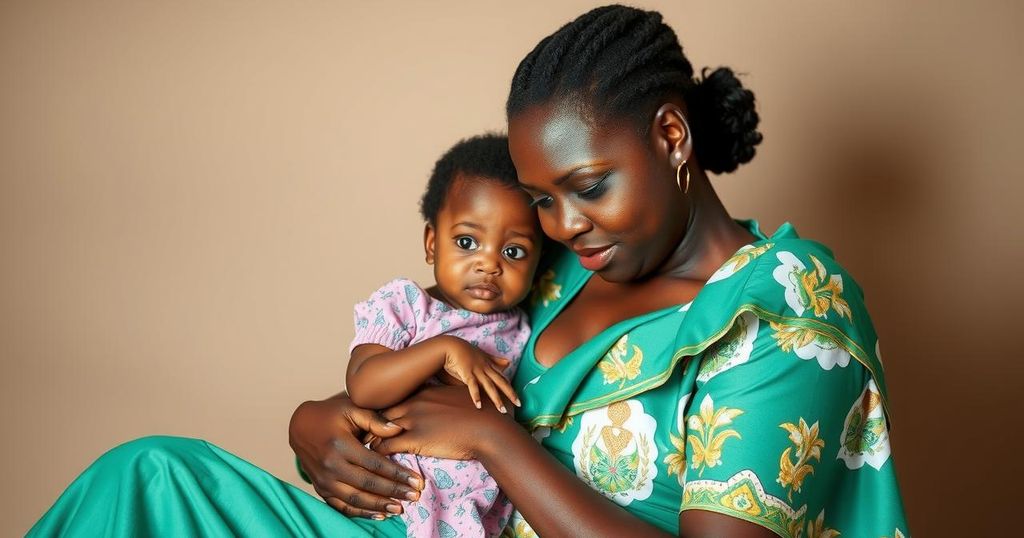Comprehensive Efforts to Reduce Maternal and Child Mortality in Nigeria

In Nigeria, substantial efforts are being made to reduce maternal and child mortality through various health initiatives, particularly in underserved regions. The Basic Health Care Provision Fund and partnership with entities like the Global Financing Facility and the World Bank have strengthened primary health services. Despite these advancements, challenges including underfunding and staffing shortages persist, requiring ongoing attention to ensure healthcare access for women and children.
In Nigeria, Hajiya A’ishatu resides on the outskirts of Tudun-Wada city and operates a local shop out of her home. She recounts the supportive care she received while delivering all her children at the Tudun Wada Primary Health Care Facility, expressing her gratitude for the attentive medical staff. Her experiences highlight a significant national initiative over the years aimed at enhancing maternal and child health services, especially in underserved areas. With Nigeria facing alarmingly high maternal and child mortality rates, accounting for 20% of the global burden, an organized response has become increasingly vital.
The Nigerian government initiated the Basic Health Care Provision Fund, directing additional resources toward primary health care. With financing from the Global Financing Facility for Women, Children and Adolescents (GFF), the program was originally piloted in three states and has since expanded nationwide. This initiative aimed to bolster approximately 900 primary healthcare facilities with necessary resources, including maternity wards and skilled health personnel. Critical services such as deliveries and prenatal care were provided at no cost, facilitating improved access for mothers and infants.
Concurrently, GFF, in collaboration with the World Bank, engaged in the Nigeria State Health Investment Project, particularly focusing on northeastern regions afflicted by conflict. From 2014 to 2020, safe deliveries in these areas surged from 22% to 68%, and yearly vaccinations for children increased significantly, tripling to 1 million. Furthermore, adolescent health became a central focus, especially given Nigeria’s youthful demographic. Projects like the Accelerating Nutrition Results focused on enhancing nutritional services, education on family planning, and offering support to nearly 5 million pregnant women and over 7 million children under five.
Despite these strides in maternal and child health, significant challenges persist. Underfunding continues to plague health services for women, children, and youth, particularly in remote areas lacking adequate facilities and resources. Zainab Umar Ciroma, Facility in Charge in Tudun Wada, remarked on the consequences of staffing shortages and long waiting times, “We used to have more and better motivated health workers… but now that’s changing.” Economic hardships have exacerbated healthcare accessibility, prompting women to seek traditional remedies and forgo critical prenatal check-ups. Patient Sumaiya Yakubu noted a troubling trend, stating, “Honestly, now so many women prefer to give birth at home because at least they don’t have to pay for anything.”
In response to these overwhelming challenges, the Nigerian government has launched the Nigeria Health Sector Renewal Investment Initiative. This initiative aims to significantly reduce maternal and child mortality through a cohesive approach to health sector reform, thereby streamlining priorities among partners. An example of collaborative financing is the World Bank’s newly approved $570 million project for primary health care, which includes substantial contributions from various global partners. The funds aim to address urgent financial gaps in health service provision and family planning resources, particularly for vulnerable groups.
As the nation navigates this critical juncture, the government’s commitment to strategic collaboration and investment presents a hopeful outlook for the health of women, children, and adolescents in Nigeria. This concerted effort may ultimately result in the preservation of countless lives and secure a fundamental right to healthcare for every individual.
The article discusses Nigeria’s efforts to combat maternal and child mortality, which are among the highest in the world. The country has initiated various programs and projects aimed at improving health services, particularly through the establishment of the Basic Health Care Provision Fund and partnerships with organizations like the GFF and the World Bank. These initiatives focus on enhancing primary healthcare facilities, increasing access to maternal and child health services, and addressing nutrition and family planning needs, especially in underserved communities. Despite progress, challenges such as underfunding, staffing shortages, and economic pressures remain significant obstacles.
In summary, Nigeria’s commitment to improving maternal and child health is exemplified through strategic initiatives and partnerships aimed at enhancing service delivery. While notable progress has been achieved, continued challenges necessitate ongoing investment and a collaborative approach to overcome barriers in healthcare access. The introduction of new financing models and targeted strategies reflects a hopeful trajectory towards safeguarding the health of vulnerable populations.
Original Source: www.worldbank.org







